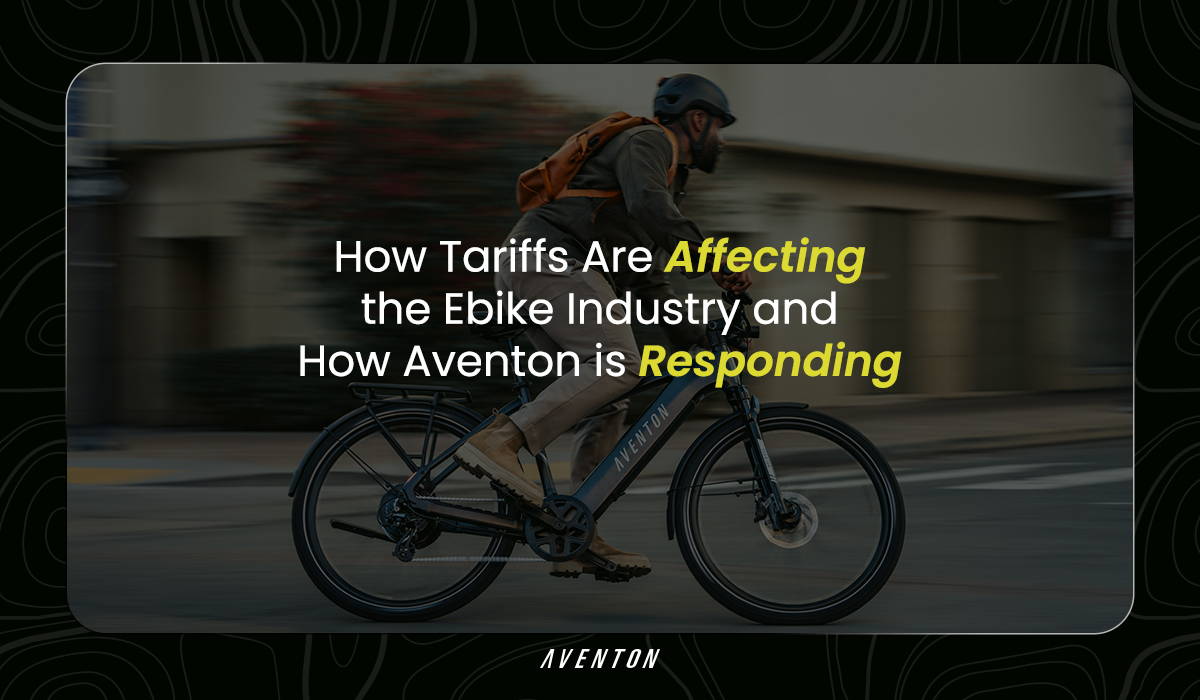
How Tariffs Are Affecting the Ebike Industry and How Aventon is Responding
May 2, 2025
The ebike industry is navigating unprecedented challenges due to shifting global trade policies, supply chain disruptions, and rising costs. At Aventon, we believe in transparency, so we want to explain how these changes affect the industry—and how we’re working to protect your access to affordable, high-quality ebikes.
The Supply Chain Shift: From China to Southeast Asia
To adapt to U.S. tariff policies, many ebike brands, including Aventon, have moved production to Southeast Asia (Thailand, Vietnam, Cambodia). This shift presents other challenges as Southeast Asia’s supply chain infrastructure is less mature, leading to higher costs for sourcing specialized components and assembling ebikes.
Increased Manufacturing Complexity
The lack of localized suppliers means critical parts (e.g., motors, batteries) still often come from China. This creates a logistical puzzle: components are shipped to Southeast Asia for assembly, then transported to the U.S. This multi-step process adds 50+ days to shipment times compared to direct manufacturing in China.
The Tariff Landscape: A Moving Target
-
Southeast Asia: Current U.S. tariffs on ebikes from Thailand and Vietnam stand at 10%, but this could change after July 2025 pending trade negotiations.
-
China: Ebikes made in China face a total tariff of 170% (145% plus a 25% Section 301 tariff imposed earlier) making them unsustainable for U.S. importers.
Loopholes & Risks: Some brands attempt to circumvent tariffs by producing frames in Cambodia, Vietnam or Taiwan, shipping them to mainland China for final assembly, and labeling them as “Southeast Asian” to exploit customs rules. Aventon rejects such practices—all our ebikes are fully manufactured in Thailand and Taiwan and we're commited to continue to work with manufacturing partners around the world in the future to bring the best product to you, ensuring full compliance.
Who Pays for Tariffs?
Tariffs are paid by importers (like Aventon) during customs clearance before products reach the U.S. soil. These costs typically trickle down to consumers through price adjustments.
Our Commitment: Absorb Costs, Don't Pass Them On
In early 2025, we proactively shifted 100% of our production to Thailand, investing in factory partnerships by sending Aventon key stakeholders from the production,quality control and industrial engineering teams. While this transition increased our manufacturing and logistics costs by 10-15%, we’ve chosen to absorb many of these expenses. Here’s why:
-
Inflation Sensitivity: We recognize that rising living costs weigh heavily on our customers.
-
Long-Term Vision: We believe ebikes should remain accessible to everyone, not just those who can afford premium pricing.
Why not make it in the U.S.?
Unfortunately, there is no supply chain of ebike components here in the U.S. and all key components are imposed with significant tariff coming from China. Having ebikes made in the U.S. is not practical unless parts tariff are lifted. Then assembly first followed by key components manufacturing in the long run is possible.
Looking Ahead
While tariffs and supply chain volatility remain ongoing challenges, Aventon is committed to leveraging our engineering and supply chain expertise to streamline production and continue to bring the best products to you. We know affordability matters now more than ever. Thank you for choosing Aventon.







 Aventon US
Aventon US
 Aventon CA
Aventon CA
 Aventon DE
Aventon DE